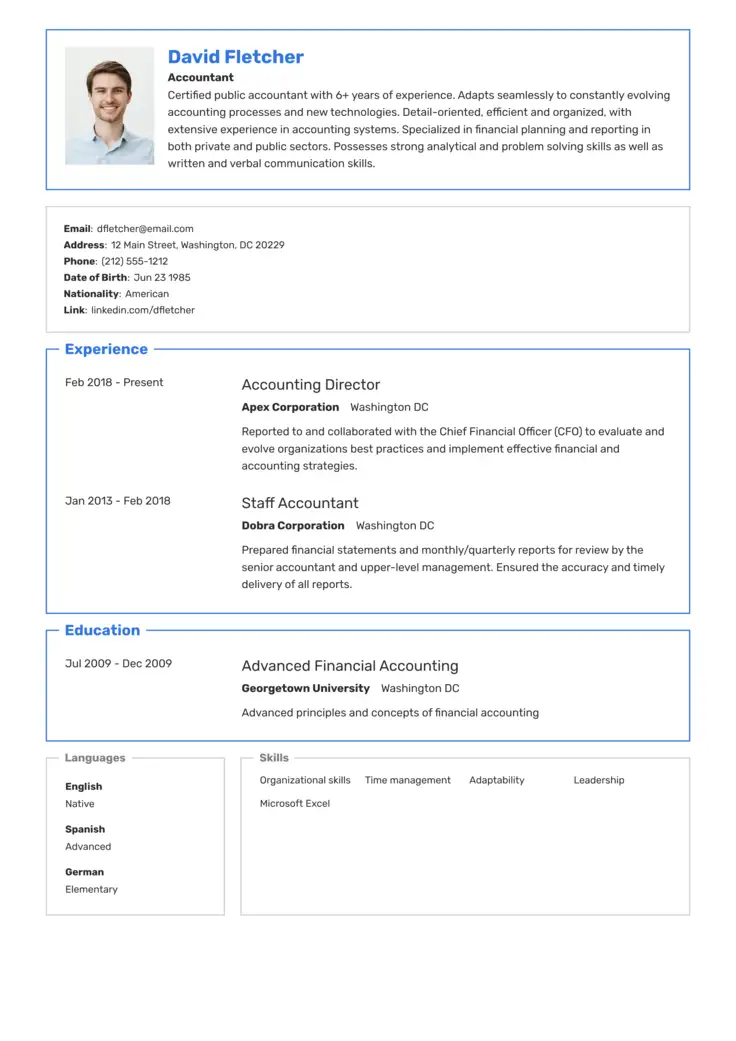Presentation skills are key to most jobs. Many people think that excellent public speaking skills are limited to professionals such as teachers and PR experts.
However, companies always look for employees who can deliver clear and engaging presentations, no matter what the role is. Knowing how to describe presentation skills on a CV is an asset that comes in handy in many levels of an organisation’s operations, from customer service to teamwork.
But what if you’re shy? Or haven’t had any formal training in presentation skills? Chances are, you already have what it takes. You just need some help getting your abilities across in your CV.
In this article, you’ll learn:
- What the most important presentation skills for the workplace are
- How to improve your presentation skills
- How to give evidence of your presentation skills as you write a CV
- Presentation skills examples that have worked for other job seekers
What presentation skills do you need?
As mentioned before, virtually every prospective employee must show a good level of communication and presentation skills.
Let’s say, for example, that you must update clients on the development of a project that you are working on for them. It’s key to make them understand in simple and attention-grabbing terms the technical side of your tasks.
This way, it’s more likely that you’ll be on the same page when it comes to setting deadlines, achievable results, and costs.
Even those who don’t deal with the public on a daily basis must be able to communicate effectively. For example, if they train a new team member who needs to be introduced to their role, the main objectives of the project, and the use of new tools.
A good presentation is made up of many parts. It’s not only what you say but also:
- The tone you use
- Your body language
- The supporting material (such as slides or models) you create
- The ability to keep within the time constraints that were set.
That’s why we could divide almost all presentations into 3 parts:
- Preparation and research. This is when you gather the information you’ll use to support your words, write your notes and prepare your materials. Depending on the specific circumstances, you may even need to book the venue or practice your speech.
- Delivery. This is the public side of your presentation, what the people in the meeting or conference room will actually hear and see. An effective delivery consists of a confident, positive tone, carefully-placed pauses, clarity, and a final summary and question time.
- Follow-up. Presentations don’t end with the meeting. You may still need to carry out a series of tasks such as collecting and storing contact information, sending emails to the attendants, taking in feedback, and more.
What presentation skills do recruiters look for?
As you can see, ‘presentation skills’ is a broad description that covers a wide range of abilities. Often, the term isn’t even used on job descriptions.
Alternatives include:
- Communication skills. Companies will write phrases such as “excellent spoken and written English”, “explain complex concepts in a clear manner”, or “communicate with a wide range of people”. Basically, they are looking for employees with impressive presentation skills.
- Analytical skills. Most people won’t think of public speakers as analysts. However, without the ability to gather, understand, and break down data, you won’t be able to deliver a compelling presentation.
- Great organisation. Presentations that make a difference often take a long time to design and organise. You want everything to go smoothly, from the A/C to the TV cable, and you want to arrive prepared at your best.
- Knowledge of presentation software. It’s easy to read between the lines when PowerPoint is among the job requirements. Other popular tools include Keynote, Google Slides, Adobe Presenter.
How can I improve presentation skills?
Not everyone is a natural communicator. Some may fall victim to stage fright when asked to speak in a meeting. Others may get nervous and use too many words to express themselves, losing the attention of the audience in the process.
Fortunately, there are simple ways to boost your presentation skills and confidence so you can see results before your next job interview.
Improving your writing
Whether you’ll be jotting down notes, a full speech, or just a few slides, writing is an important part of any presentation. If you’ve always been a better communicator in person, it may be time to work on your weaknesses. Here are some tips:
- Read more. Avid readers often become excellent writers. Start by reading more of something you’re passionate about, from the news on your commute to that novel on your bedside table. If you feel like it, you can also read manuals and other technical material to interiorise the lingo of your dream job.
- Give yourself tasks. Imagine writing an email for a client, a recipe for a family member, a guide for your coworkers. Now do it. Practice different writing styles for different audiences and maybe ask for help and feedback from a friend.
- Start writing for the public. When you feel more confident, you can publish a blog or write articles for specialised magazines.
Improving your oral communication
If you feel uneasy when speaking in public or don’t think you are as effective as you wish, you can try to:
- Practice, and then practice more. Try to debate with a friend and change their mind to work on your negotiation skills, or explain to a family member how to set up their new phone to learn how to give clearer instructions.
- Boost your confidence. Start speaking up more in groups where you feel comfortable, like the sports team or volunteer group you’re part of. Offer to take on more public roles to practice your speaking and presentation skills in a friendly environment.
- Focus on body language. Whenever you can and whatever the setting, keep in mind your body language. Are you making eye contact? Are you keeping your hands and feet still in a relaxed and natural manner?
How do you write presentation skills on a CV?
Simply putting down “excellent presentation skills” on your CV will not leave a good impression on potential recruiters. The skills section is extremely important, and you should dedicate special attention and time to it. Avoid trite phrases and simple copy-pasting from the job descriptions.
But how can you convince HR managers that you are a stellar public speaker? Here are ways to make your presentation skills shine on your CV:
- Be specific. Have you organised and/or led workshops? Have you participated as a panel member in conferences and seminars? Are you responsible for the training of new colleagues?
- Use numbers. Numbers and percentages speak volumes in a CV. Virtually every impact you have made can be turned into data, from the number of coworkers you have mentored to your lectures’ attendance rate.
- Show your technical skills. If you can use specific presentation software and other tools that clearly speak for your expertise, don’t hesitate to write them down. It will prove in a few bulleted items that you know what you’re talking about.
Examples of Presentation Skills on a CV
Now we’ve gone over the theory, let’s delve into specific presentation skills examples in different sections of your CV, from the summary to job descriptions and the skills section.
CV Summary
A well-crafted CV summary encapsulates your top achievements, skills, and career goals. Incorporating your presentation skills here can make a strong first impression.
Here are two examples:
- Results-driven Marketing Manager with 10+ years’ experience. Proven ability to deliver compelling presentations, having led a cross-functional team to a 25% increase in product adoption rates. Excellent skills in data analysis and strategy development.
- Accomplished educator with over 15 years in the academic field, specializing in curriculum design and student engagement. Exceptional presentation skills, consistently receiving high feedback scores for clarity and creativity in lecture delivery.
CV Objective
A CV objective takes the place of a summary for entry-level job-seekers. It should outline your career goals while emphasizing how you can contribute to the prospective company.
Here’s how you could incorporate presentation skills into an objective for your first CV:
- Highly motivated Business Graduate seeking a sales position at Parker Corp. Strong presentation and communication skills, honed through university projects and internships, where I effectively pitched ideas and strategies to diverse audiences.
- Detail-oriented IT Specialist looking to join Swindell Tech. Proficient in presenting complex technical information to non-technical stakeholders, aiming to improve system understanding and drive informed decision-making.
In Job Descriptions
Every role you’ve held provides an opportunity to describe presentation skills on your CV. Use specific examples in each of your job descriptions to illustrate how your presentations delivered value.
Here are two examples:
February 2018 – Present Financial Analyst
DEF Finance, London, UK
- Presented monthly budget forecasts to the executive team, offering insights that informed strategic decision-making.
November 2019 – Present Team Lead
GHI Retail, Sheffield, UK
- Regularly conducted team meetings, presenting performance metrics and motivational talks that boosted team productivity by 15%.
Each of these examples not only mentions the presentation skills. They also lay out the positive impact they created. This makes your CV more persuasive and impactful to potential employers.
In the Skills Section
In this section, you can include presentation as a standalone skill or break it down into more specific abilities. For instance:
Skills
- Public speaking
- Data visualization
- Interactive communication
- Slide creation
When you’re constructing your CV, it’s crucial to remember that stating “good presentation skills” is not enough. You need to provide clear examples and context to demonstrate your abilities effectively.
As a final piece of advice, make sure to choose a cv template or come up with a design that is suitable for your industry and audience and highlights the right sections of your professional profile.
Related Posts




